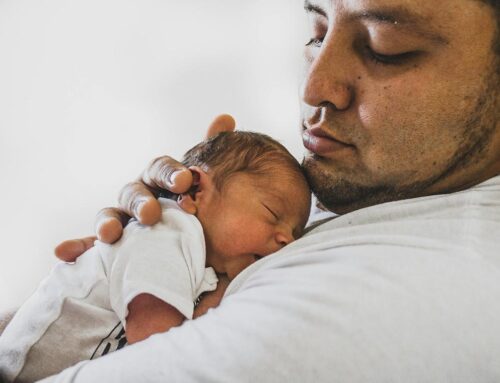1. Introduction
This chapter will address some common questions that parents have about bringing baby in for the first newborn checkup. It will also review what to expect at these and all subsequent well-baby visits. Keep in mind that each family is unique and that the circumstances surrounding each baby’s birth and life at home will vary. The recommendations given by the healthcare provider may vary as well. It is the goal of the healthcare provider and the office staff to work with you to ensure the best possible care for your new family member. We also want to address any concerns that you have and to help you learn how to comfortably care for your baby at home. It is a good idea to write down any concerns or questions that you have so that you are sure to remember to ask the healthcare provider at the visit.
Seeing a child for the first time is a most cherished but also a stressful time for new parents. Adjusting to a new family member and caring for a newborn is quite a challenge. Over the next several months, you will become an expert on your baby, recognizing his cries for hunger, pain, or discomfort. However, it is quite common that parents of newborns have a lot of questions and concerns about the health and care of their baby, especially when they are first-time parents. In the newborn period, many babies are carefully examined at the hospital or birthing center by a pediatrician or family practice physician. When both mom and baby are healthy and have had an uncomplicated delivery, they are usually discharged after a day or two. It is important to know some information about the first doctor’s visit for your baby.
1.1. Purpose of the Blog
It is this last responsibility that is the focus of this blog. Children grow and develop at an amazing pace. In the first few years of life, they accomplish many tasks: rolling over, sitting up, crawling, and walking. They learn to talk, to feed themselves, and to use the toilet. And through all of this, parents become experts on their own children. They know their child’s likes and dislikes, strengths and weaknesses, and are often the first to recognize an illness. However, growth and development is not just a physical process, it is a biological one. And as with all biological processes, there is a great deal of variability. This is the reason that your child’s doctor wants to see him frequently during the first few years of life. In addition to monitoring your child’s growth and development, these visits are a chance to answer your questions and help you to be the best parent you can be. With knowledge comes confidence, and our goal is to help you grow a healthy child. So let’s get started.
The birth of a baby is a remarkable event; it is the introduction of a unique individual into the world. Every new life holds the promise of happiness, excitement, and achievements, and is a reason for hope and renewal. However, as any parent can tell you, the arrival of a new baby is accompanied by an overwhelming sense of responsibility. As you gaze at this tiny, perfect being, you realize that you are completely responsible for this helpless little person. You are responsible for feeding, bathing, changing, and comforting him. You are responsible for teaching him right from wrong and for protecting him from harm. And most importantly, you are responsible for making sure that he grows up healthy and strong.
2. Importance of Regular Doctor Visits for Newborns
The first visit usually occurs within a few days after hospital discharge, and the next happens at approximately one to two weeks of age. These frequent early appointments are important for monitoring the baby’s weight gain and overall health, as well as addressing any parental questions or concerns. Parents should keep a list of questions or issues that arise between visits to discuss with the pediatrician at the next checkup. Whether parents are experiencing their first newborn or are seasoned veterans, it is normal to have countless questions and concerns about the baby’s health, the transition to home, and caring for a new little life. That is why pediatricians are there to help and guide parents through the unique journey of raising a child.
After a newborn is discharged from the hospital, parents are often given a list of instructions regarding follow-up appointments with the pediatrician and are sometimes overwhelmed or too preoccupied to fully comprehend the importance of those first few visits. It is crucial for parents to understand the significance of these early well-child checks and to be aware of common questions or concerns that may be addressed with the pediatrician. Even if the baby seems healthy, feeding issues, jaundice, weight gain, and parental anxiety are all reasons to ensure that parents are following the advised visit schedule.
2.1. Building a Relationship with the Pediatrician
Choosing a pediatrician is a preference as to who can answer your questions. We recommend you to write down all the issues and the questions during the visit. The office staff, including the nurses, nurse practitioners, and physician’s assistant, are your representatives that will help you to communicate them to the doctor, but they are all qualified to give you many parenting advice and tips on how to care for your baby. This way, you get proper medical care for your baby and make sure that you are working with the right doctor that meets your needs. No one prepares you for the ride home when you are on your own. Make sure to ask your doctor, preferably before you leave the hospital, how to get in touch for an urgent issue after hours. If the doctor is always available to give you urgent advice when you need it, it will make it easier for you to sleep at night. You might eventually ask questions that are outside of the medical field, but it is useful to ask your doctor if they have children and especially if they would take care of their own children in the way they are advising you to do for your baby. This is an important first visit to get to know your pediatrician and the office staff. Down the road, you may have a preference to only be seen by certain office staff that you trust the most to provide you the best answers.
3. Common Questions Asked by Parents
How do I know if my baby is getting enough milk? In the first two to three days of life, your baby will receive colostrum, which is thick and yellow and high in protein. Colostrum is in small amounts but is all your baby needs until your milk comes in on the third or fourth day. Your breasts will feel full and milk production will be evident when your baby’s cheeks are rounded and you hear him/her swallowing. Your baby should have at least two wet diapers and one stool each day of life until your milk comes in. After your milk comes in, your baby will have at least six wet diapers and 3-4 stools each day. Most infants eat every 2-3 hours. If you are unsure if your baby is getting enough milk, talk to your doctor or a lactation consultant.
Do I need to wake my baby for feedings? For the first two weeks of life, your baby will need to eat every 2-3 hours. It is unlikely that your baby will wake on his/her own to eat during this time. Waking the baby to feed is very important to establish good weight gain and your milk supply. After the first two weeks, you can let your baby sleep as long as he/she wants at night, but don’t let more than 4-5 hours go by without feeding during the day. Eventually, your baby will wake on his/her own to eat.
3.1. What Happens During a Routine Newborn Check-up?
In addition to this physical exam, the healthcare provider will ask you some questions about how your baby is eating and sleeping. They will want to know how often your baby is feeding and how many wet and dirty diapers they have in a day. They will also ask about any concerns you may have. This is a good time to bring up any questions or issues you have about your baby’s health. After the exam, the healthcare provider will talk to you about how your baby is doing and provide you with any necessary information or instructions. This is also a good time to schedule your baby’s next check-up.
During a routine newborn check-up, the healthcare provider will examine your baby from head to toe. They will check your baby’s weight, length, and head circumference to make sure they are growing properly. They will also look at your baby’s skin, eyes, ears, and mouth. They will listen to your baby’s heart and lungs with a stethoscope. They will also feel your baby’s belly to make sure everything seems normal.
4. Preparing for the Doctor’s Visit
Make sure to have any hospital paperwork given to you at discharge from the nursery or NICU, as well as a record of your baby’s feeding and diapering (urination and defecation) schedule for the first few days of life. Be prepared to discuss this information and any other questions the pediatrician may ask about your baby’s health. As an active participant in your baby’s health, you will be better able to help the doctor make the best medical decisions for your baby’s care. With a better understanding of your baby’s health and development, you will be better equipped to care for your newborn at home.
As a parent, you are the primary caretaker of your child’s health. Before taking your baby to the pediatrician for the first time, consider these tips on how to prepare for and get the most out of the visit. Although doctors are there to help you understand the health and development of your child, they see many patients in a day and rely on parents to provide them with the most accurate information. Bringing a list of questions and concerns to the appointment will help you address all the points you want to discuss. Additionally, make sure to write down and be prepared to discuss important information about your baby’s health history, including complications during pregnancy, and your baby’s delivery and hospital stay.
4.1. What to Bring to the Appointment
Additionally, bringing a diaper bag stocked with extra diapers, wipes, and formula (if the baby is not exclusively breastfed) is a good idea in case the appointment runs longer than expected. Some doctor’s offices may offer the patient new parent packets that include helpful information about the baby’s development, as well as coupons for items such as diapers, formula, and baby clothing. Be sure to ask the office staff if this is available. Finally, do not forget to bring the baby! It is very important to schedule newborn check-ups with the pediatrician within the first few days of discharge from the hospital. This is typically a brief appointment to ensure that the baby is healthy and thriving.
For the first check-up with your baby’s doctor, parents should bring the following: any paperwork given at the hospital where the baby was born, the baby’s insurance card, and a blanket to keep the baby warm. Bringing a list of questions is also helpful. It is likely that parents will have many questions about their newborn, as this is a very exciting and nervous time for them, so having a written list ready to go will ensure that nothing is forgotten. It is also important to write down any advice or recommendations given by the doctor during the appointment.
5. Conclusion
Whether you’re a first time parent or a seasoned veteran, dealing with a new baby is a new experience every time. And just as every baby is different, every visit with the pediatrician may be different depending on the baby’s age and particular health concerns. But no matter what, those visits are an important opportunity for you to address any concerns you may have about your baby’s health and to receive the education that you need in order to help your baby grow up healthy and strong.
Bringing your baby in to see the pediatrician can be a nerve-wracking experience. You’re still getting to know this brand new little person and suddenly there are numbers and measurements and questions about bodily functions that you’re responsible for. It’s completely normal to have a lot of questions at these visits. And hopefully this article has taken some of the mystery out of what happens at those early newborn visits.
5.1. Key Takeaways
As a new parent, you are likely to have many questions about your baby’s health and what to expect at each of their doctor’s visits. While it is easy to find yourself overwhelmed with concerns, it is helpful to know the common topics that will be addressed when you take your newborn in for a check-up. After birth, you will likely have an appointment with a pediatrician within the next few days. These initial visits are very important to ensure the health and safety of your baby. Be sure to bring a list of questions and concerns you may have about your newborn’s health and well-being.
Taking your newborn to the doctor can be nerve-wracking, especially if you are a first-time parent. It is important to remember that these visits are intended to ensure the health and safety of your child. While you may have many concerns and questions about your baby’s well-being, there are a few common topics that the doctor will address during each visit. They will record your baby’s weight, length, and head circumference on growth charts to ensure they are developing properly. Your baby’s eating habits, sleeping patterns, and general behaviors will also be discussed. Your doctor will ask about any diaper rashes, dry skin, or other external conditions your baby may be experiencing. Reviewing and updating your baby’s immunization schedule will be an ongoing conversation at each visit as well.
Looking forward to marvels? Step inside and learn what makes us extraordinary!
References:
Chou, J. H., Roumiantsev, S., and Singh, R. “PediTools electronic growth chart calculators: applications in clinical care, research, and quality improvement.” Journal of Medical Internet Research, 2020. jmir.org
Pimenta, João Roberto R., et al. “Comparison of birth weight, length, and head circumference between the BRISA-RP and Intergrowth-21st cohorts.” Jornal de Pediatria 96 (2020): 511-519. scielo.br
Fenton, Tanis R., et al. “Weight, length, and head circumference at 36 weeks are not predictive of later cognitive impairment in very preterm infants.” Journal of Perinatology 41.3 (2021): 606-614. [HTML]
Shur, Natasha, et al. “The past, present, and future of child growth monitoring: A review and primer for clinical genetics.” American Journal of Medical Genetics Part A 191.4 (2023): 948-961. [HTML]
Foote, Jan M., et al. “Growth measurement practices from a national survey of neonatal nurses.” Journal of pediatric nursing 52 (2020): 10-17. [HTML]
Pereira-da-Silva, Luis, et al. “Recommendations of charts and reference values for assessing growth of preterm infants: update by the Portuguese Neonatal Society.” Port J Pediatr 51.1 (2020): 73-8. unl.pt
Keller, J. A. “Counting the weighs: growth velocity tables for preterm infants.” Nutrition in Clinical Practice, 2020. [HTML]
Hocquette, Alice, et al. “International versus national growth charts for identifying small and large-for-gestational age newborns: a population-based study in 15 European countries.” The Lancet Regional Health–Europe 8 (2021). thelancet.com
Radgohar, Homa, Hamed Vahdat-Nejad, and Saber Mohammadzadeh Rezaie. “Infant’s growth and nutrition monitoring system.” SN Applied Sciences 2.9 (2020): 1477. springer.com
Hocquette, Alice, et al. “World Health Organization fetal growth charts applied in a French birth cohort.” Journal of Gynecology Obstetrics and Human Reproduction 51.3 (2022): 102308. sciencedirect.com






